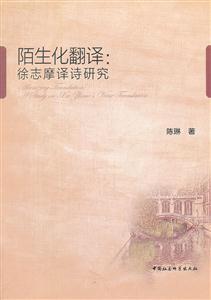Introduction 0.1 Significance of the Research into Xu as a Poet-cum-Translator 0.2 Review of the Research into Xu' s Verse Translation 0.3 Objectives and Research Method 0.4 Composition and ConstructionChapter 1 Social, Cultural, and Personal Background 1.1 Social, Cultural, and Creative Writing Conditions for the Artistic Field in Modern China: Attempts at Westernization 1.2 Translation Agenda in Xu's Day 1.3 Biographical Evidence for Xu' s Disposition of Open-Mindedness to the New 1.4 Xu's Verse Translation Practice and Thinking 1.4.1 Interest in Literary Uniqueness of the Source Text 1.4.2 Translation Ideal versus Formal Shift 1.4.3 Experiment with the Expressivity of Vernacular Chinese 1.5 SummaryChapter 2 From Defamiliarization to Alienation Effect 2.1 Defamiliarization 2.1.1 Shklovsky' s Definition 2.1.2 Nature of Defamiliarization 2.1.3 Insights into the Novelty of Poetic Language 2.2 Alienation Effect 2.2.1 Brecht' s Definition 2.2.2 Differences between Defamiliarization and Alienation Effect 2.3 Subjective Artistic Nature of Literary Translation 2.4 SummaryChapter 3 Alienizing Translation 3.1 Definition 3.1.1 Understanding of Defamiliarization in Translation Studies 3.1.2 Working Definition 3.2 Procedures of Alienizing Translation regarding the Ontological Nature of Translation 3.2.1 Alienization Procedure 3.2.2 Hybridization Procedure 3.3 SummaryChapter 4 Interness as the Philosophical Motivation for Alienizing Translation 4.1 Interness 4.1.1 Interness as the Result of Intersubjectivity 4.1.2 Interness as the Recognition of Cultural Respect and Complement in Translating 4.2 Interidentity of a Poet-cum-translator 4.3 Translational Intersubjectivity between Xu and His Translated Poets 4.4 Inter-textual Reference as a Semiotic Construct 4.5 Interdiscursivity of the Language of Translation, Themes,and Schools of Poets 4.5.1 Hybridization of the Versification of the Classical Regulated Metrical Chinese Verse 4.5.2 Rhymed Verse versus Free Verse 4.5.3 Diversity of Themes and Schools of Poets 4.6 Intergender of the Feminine and Masculine 4.7 SummaryChapter 5 Alienizing Translation in Relation to the Manipulation of Translation Norms 5.1 Significance of Translation Norms for the Newness Effect of Translation 5.1.1 Complementary Relationship between Toury' s and Chesterman' s Norms 5.1.2 Reader' s Expectations for Newness and Norm-Breaking Translation 5.2 Translation Norms in the Period of Xu's Translation Activity 5.2.1 Translation Norms in the Late Qing Dynasty and Early Republican Period 5.2.2 Norm of the Language of Translation in the 1920s 5.2.3 Translation Norms regarding the Debate on the Language of Translation 5.2.4 Translation Norms of Verse Translation in the 1920s 5.3 Subjection to the Translation Norms for the Alienizing Translation Effect 5.3.1 In Conformity with Initial Norm : Naturalized into Chinese Verse 5.3.2 Subjection to Preliminary Norm and Accountability Norm: Committment to the Movement of the New Poetry and the Crescent Society 5.3.3 Subjection to Textual-Linguistic Norm: Use of Coinage and Vernacular Colloquialism 5.4 SummaryConclusionAppendix Xu Zhimo's Verse TranslationReferencesAfterword





















